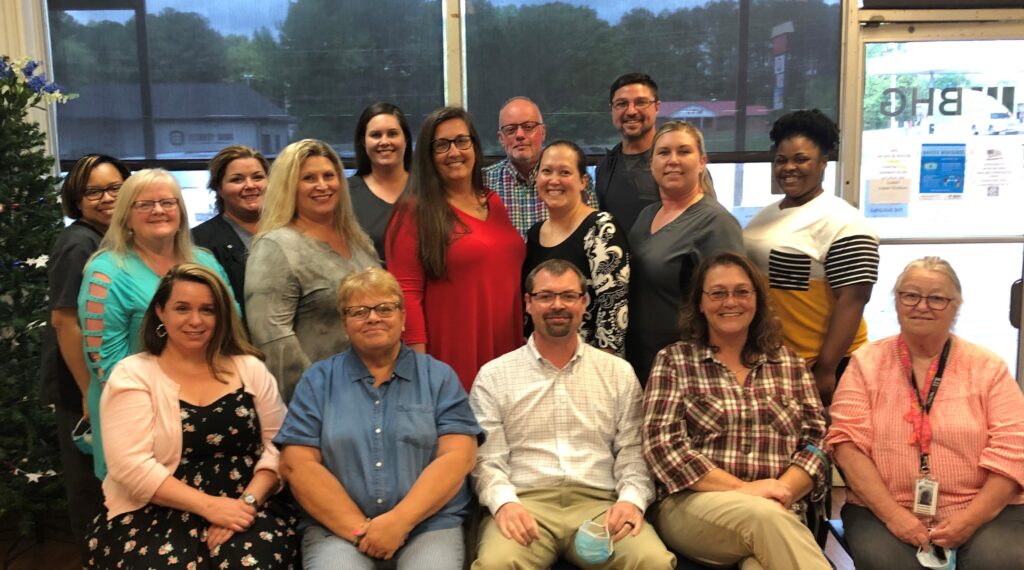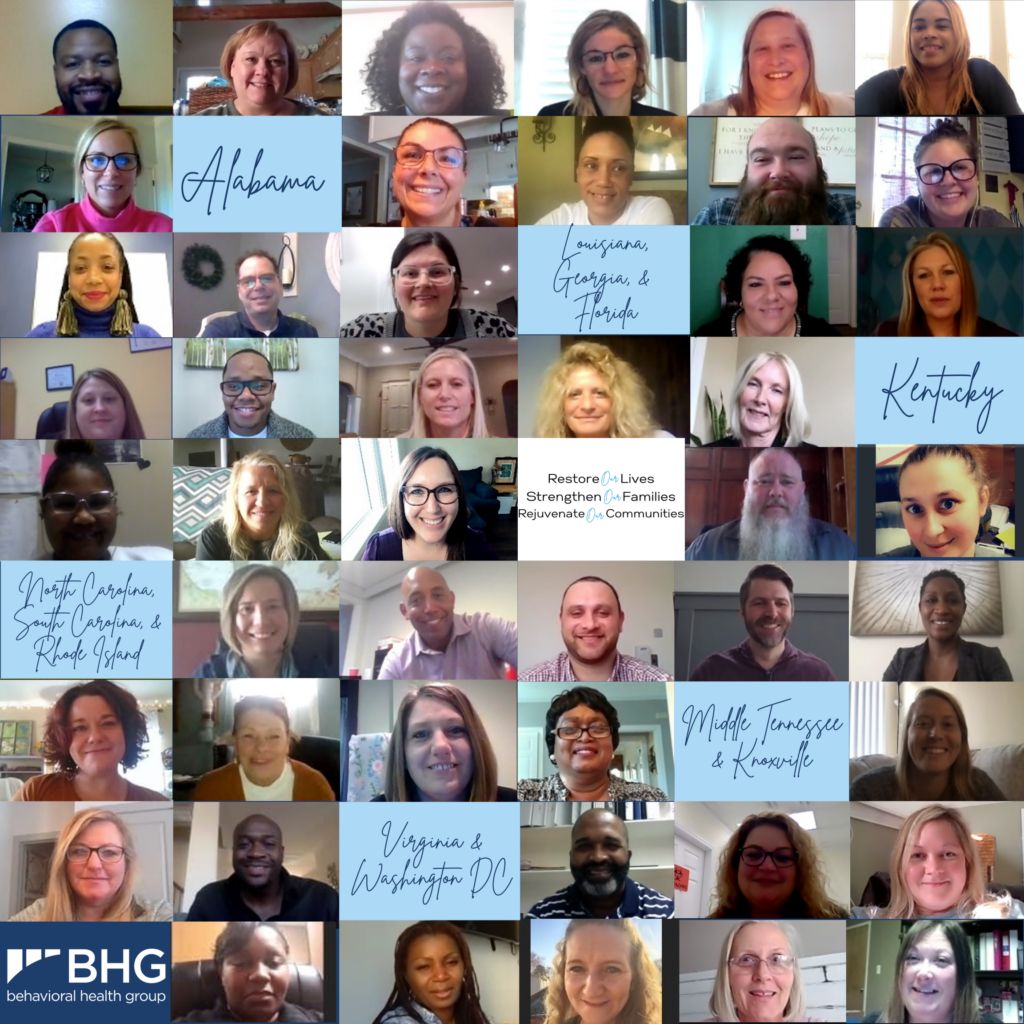2020 Treatment Center of the Year
by Edmond Alley, Regional Director – West Tennessee
We are so proud to recognize the Paris, TN team as the 2020 Treatment Center of the Year! About 6,000 people live in this small town near the Tennessee River. It’s common for Southerners to not know about or support our approach to recovery and treatment. But, for the past 10 years, the community has come to understand the life-saving work of this all-around dedicated, tight-knit team who have shown time and again that they’ll do whatever it takes to help patients on their recovery journey.
A model treatment center
With no staff turnover, ever, their numbers tell the story of a model center. Now that treatment is covered by Medicare and Medicaid, they’ve seen a tremendous census growth, currently serving 425 patients with less than 2% no-shows. Their first 90-days retention rate is at 74%.
What makes this meticulously well-run center successful is the leadership of its strong Program Director, Lisa Smith. Whether she’ll say it about herself or not, she’s the boss. She’s also someone I call on for a sounding board or to mentor other Program Directors and staff. Both her staff and patients love that about her and always know where they stand with her. She is partnered by an equally strong counseling supervisor, Lee Ann Hayes, and nursing supervisor, Kathie Walton. Together they have assembled the right team of people in the right positions who fiercely protect their culture and care for each other and their patients.
As caseloads have increased, so has the need for more staff. But instead of making quick-hire decisions to lighten individual loads, this team willingly takes on extra patients for however long it takes to find the right person who fits their fearless, committed DNA.

Strong leadership makes it all work
A native of Henderson, TN, Lisa lives in Paris with her husband and their three children ages 9, 6 and 4. She’s dedicated to her family which speaks volumes about her integrity. She wouldn’t ask anyone to do anything she can’t do herself. In order to make sure she’s getting things done, it’s not unusual for her to be at the clinic at 3:30 or 4 in the morning. When colleagues need to take off work for life and family matters, this team doesn’t hesitate to pick up the slack for each other.
“The Paris center is a great example for our company,” said Chad Coursey, Regional VP for BHG. “They have a site that is growing like gangbusters. Growth can be painful. Many of their patients have higher acuity and the staff seems to take it all in stride. That speaks volumes for the leadership Lisa provides and the time she invests in her people.”
Even with COVID-19, they’re providing what patients need to stay compliant by gearing up in full PPE and medicating them at their cars. Many appointments are still done through telehealth, but they will meet in person, masked up and socially distanced, if needed. No one in that clinic is afraid to jump in and help save somebody’s life.
Community engagement is a priority
The center has established a trusted reputation in the community. I remember when people would say “Oh, there’s that methadone clinic.” Now, law enforcement and the powers that be recognize them as more than that. One of the ways they’ve achieved this is with funds from a grant that focuses on individuals without TennCare.
“I’ve tried to turn it around in Paris so that they know we’re here helping people. If I can help teachers by catering lunch, educating them about us and ease their day a little, I’m also helping the children. It’s a systemic approach. If a parent is on heroin and their kids don’t show up to school and the truancy officer finds them on the street, then how many people’s lives are really affected?”
“We’ve had police stop and ask people who are walking down the street where they’re going, and when they answer ‘to our clinic,’ the officers give them a ride.”
“I love this job. If you would’ve asked me 15 years ago if I’d be working in a methadone clinic, I couldn’t have told you what it was,” said Lisa. “You definitely have to love what you do to work in a clinic. Quite frankly, I feel like I’m here in life to serve others.”
“We’re just a big family. We’re here to help each other. I don’t really see myself as a Program Director. I’m just the person in charge and guiding people where to go and get help. I’m no more important than my Patient Registration Coordinators. My staff here, I can’t say enough about them.”
Learn people’s stories
“It’s the same with the patients. We’ve got about 420 patients and I can tell you 419 of their stories. I try to know what’s going on in their lives. I see their kids at school or in town. That’s how I am. I can be forceful or maybe a force to be reckoned with, but that’s part of my job. I expect the best out of everybody.”
“I could never compliment my staff enough about what they do on a daily basis. My nurse supervisor always works six days a week. She doesn’t clock in, but I guarantee you she works 60 to 70 hours a week.”
Lisa can regularly be found in the lobby talking with patients and their families for hours. She often says, “I didn’t get anything done on paper today, but what I did kept this clinic together.”
“I meet with most people who come through the door here. I remember a patient who lost her arm in a car wreck which led to her addiction. She was scared to death to come in. I told her ‘I know you’re an addict. I‘m not here to judge you. I’m here to help you.’ She told me she was thankful I treated her like a person.”
Interactions like this have created word-of-mouth patient referrals from as far as an hour-and-a-half away in the 12,000-person Lamar County.
Let’s learn from one another
As we all daily reinforce “a new class of recovery” in our work, I believe the BHG Paris Treatment Center exudes key tenets from which we can all learn.
- Put your people and culture first.
- Invest time wisely and patiently in hiring the right people for the right roles.
- Maximize opportunities to continuously listen to, collaborate with and train your staff.
- Make connections by learning people’s stories. Get to know the details of your staff and patients’ lives.
- Engage in your community. It really does take a village to restore lives, strengthen families and rejuvenate communities.
PD workshops foster collaboration, development, well-being
by Amanda Karistai, Regional VP of Operations
As a former Program Director, I know what it’s like to constantly juggle multiple priorities in a treatment center. Program Directors have tons of responsibilities; they spend each day addressing patient concerns, supporting their teams, maintaining regulatory compliance, and managing the business elements of their center. It’s a tough job, made even tougher at times by feeling disconnected from colleagues and other company leaders. Some of our best ideas to move the company forward have come from the Field, but it’s impossible to cultivate new growth if we stay so heads-down busy that we forget to pause, refuel and reset. That’s why our new Program Director Workshops are so important.
In an effort to help support our Program Directors, these workshops provide:
- time and space for clear, creative and strategic thinking;
- improved company-wide communication and collaboration;
- professional development opportunities;
- helpful conversations about best practices;
- a safe, encouraging environment to ask questions and share ideas and concerns.
Each quarter every region participates in a PD Workshop. The group generally consists of four to ten Program Directors and the Regional Director, which allows for region-specific discussion and quality time together. Workshops in the first part of the year were conducted via Zoom and we’re excited to hold them in person soon!
The first quarter workshops were extremely well received; PDs said they appreciated the time with and transparency of our leaders and they felt like they were being given an opportunity to grow their leadership skills. Session topics included:
- leadership development strategies presented by our CEO, Jay Higham, and COO, Julie Koenig;
- clinical quality led by our Chief Medical Officer, Dr. Ben Nordstrom;
- compliance updates from Jaimee McGuire, Director of Regulatory Affairs and the Compliance Specialists;
- collaboration opportunities where PDs talked about their needs, what’s working and not working, and shared best practices;
- functional learning sessions about budgeting, planning, employee turnover and KPIs;
- a region-specific update attended by all team members, outlining important company news and initiatives, as well as celebrating successes of that region.
The Program Directors played some fun games, enjoyed their time together, and have even joined a PD Facebook group where they can ask questions and share lessons learned in and outside of the workshop.
My goal as a leader at BHG is to create an environment where our teams feel supported, heard and appreciated. I want each team member to have the tools, resources and clear information to be able to effectively serve our patients. This starts with making sure our Program Directors are well-equipped to support their dynamic teams doing the hard work each day in the treatment centers.
I believe these workshops are a great start. At the end of the day, in order to restore lives, strengthen families and rejuvenate communities, we need to take a step back, breathe deep and invest in ourselves. It’s the only way to continue in our mission together. As we do, we find that we restore our own lives, strengthen our own families, and rejuvenate our own communities too.
Do you have ideas to share or questions about how we continue down this path? Reach out to me at 504-215-4045 or [email protected].

